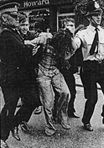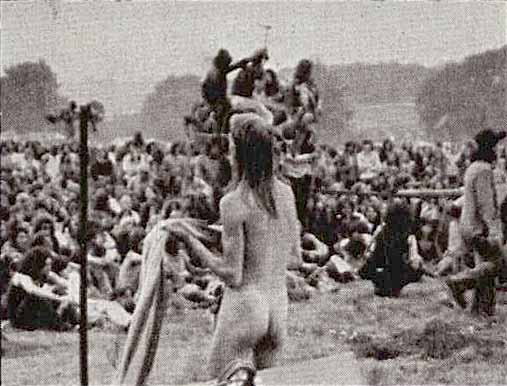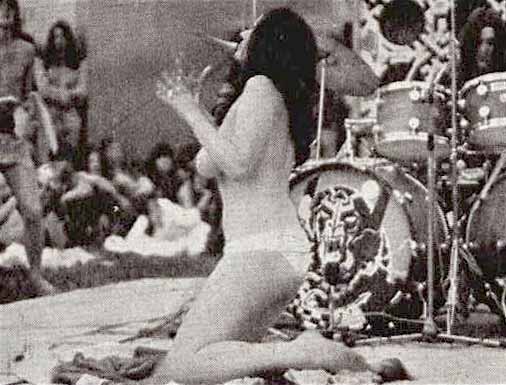


The Archive.
View this site at 800 x 600 resolution or higher for best results .
Last updated Dec 14th 2003.
 |

|
 |
Any comments to add about the Windsor Festivals Contact us
The Release report .
INTRODUCTION
Truncheons in the Park"
has been prepared to counterbalance the report prepared by Thames Valley Police
Chief Constable Holdsworth relating to the events that took place at the third
annual Windsor Free Festival, 24th to 29th August 1974. In this report, we present
allegations against the Thames Valley Police Force supported by statements from
individuals and solicitors. Since this Release report is at such variance with
the Holdsworth report, which contains no criticism of police behaviour at Windsor,
we believe only a full public inquiry under s.32 Police Act 1964 can properly
investigate what happened at Windsor and why.
Release staff and volunteers were on the site through the festival. Release
doctors and psychiatrists provided free professional medical assistance. Release-affiliated
solicitors made special trips from London to advise people held in army barracks
(when allowed) and to advise and represent those charged in Windsor Magistrates'
Court.
Photo © Boz |
Since August 29th, we have collected more than ninety individual statements, fourteen reports from solicitors, photographs, film and press clippings relating to the events at Windsor. More information is being sent to us daily. Analysis of this information indicates that a multitude of police abuses occurred at Windsor. We have enumerated twenty-two specific allegations, substantiated by statements received, to support our demand for a full public inquiry - a proposal that has been taken up by seven national newspapers (the Guardian, Daily Mail, Daily Mirror, Morning Star, The Sun, Times and Daily Telegraph). The Home Secretary so far has only called for a report from Mr Holdsworth which has resulted in a predictable internal "whitewash". And now, Mr David Hall, Assistant Chief Constable of Staffordshire Police has been asked by Mr Holdsworth to investigate complaints against individual officers. The use of this procedure means that Chief Constable Holdsworth and Assistant Chief Constable (Operations) Soper are immune from investigation (Police (Discipline) Regulations 1965 reg. 20). |
It would be grotesque to see junior officers who overstepped the mark at Windsor, being dealt with at formal disciplinary proceedings by a man ultimately far more culpable than themselves. The Staffordshire Police investigation can only result in disciplinary action taken against individual police officers. It cannot possibly produce a full account of the whole police operation assigning responsibility for the grave errors and misjudgements that were made. We feel that this manoeuvre is a blatant attempt to divert attention from the men responsible.
The
premeditated military-style swoop of 29th August was organised and handled in
such a way that violence was the onlypossible outcome. The large number of random
searches, police bail refusals, and other police irregularities enumerated in
this report must also be explained by Mr Holdsworth as Chief Constable for the
Thames Valley Police Force.
We have divided this report into four sections.
1. Pre-festival negotiations - did it have to happen?
2. Allegations of illegal police actions.
3. Home Office correspondence and negotiations - a public inquiry, how close are we?
4. Appendix of statement extracts and Home Office letters.
Not only must a full inquiry be held, but measures must be taken to ensure that the Thames Valley Police Force do not repeat their actions at Windsor; that the Advisory Committee on Pop Festivals be reactivated to work towards an effective and enjoyable fourth Annual Windsor Free Festival for 1975; and that the law authorising widely abused power of search now embodied in s.23 Misuse of Drugs Act 1971 should be clarified and all police forces required to observe it strictly.
Release is prepared to produce statements, evidence and witnesses to substantiate these allegations before a full public inquiry.
PRE-FESTIVAL
NEGOTIATIONS - DID IT HAVE TO HAPPEN?
The
Festival Welfare Services Committee, ("FWS"), a co-ordinating body
on which Release sits with representatives from Civil Aid, St. John's Ambulance
Brigade, British Council of Churches Youth Department, Salvation Army and other
organisations,was involved in planning for Windsor long in advance.
Before last year's festival, FWS offered its assistance to the Crown Estate
Commissioners, but received no reply to its letter until the Festival was over,
and when the reply finally arrived, it merely said that :
"arrangements in connection with the unauthorised
events which certain individuals have planned for Windsor Great Park over the
Bank Holiday weekend are in the hands of the Thames Valley Police and the Commissioners
do not wish to avail themselves of assistance from other quarters".
We knew that the Commissioners were taking the same line
this year, and that they were refusing to talk to anybody about any aspect of
the problems the Festival was likely to cause.
The official attitude of the local authority was the same -they refused even to sell the festival organisers any plastic rubbish sacks for site clearance. Some of the officers of the authority, however, took a more realistic view. On June 25th a representative of FWS attended a meeting at Windsor called by Mr E.J. Ferguson, Assistant Divisional Director of Social Services and attended also by the Medical Officer to the District Council,and representatives of the local hospitals, the Drug Squad, and others. At this meeting it was agreed that arrangements would be made for FWS to operate welfare services on a site outside the park but within easy reach of the festival. The Army were approached, and Captain J.W. Matthews of Combermere Barracks agreed to allow the use of their sports field near Queen Anne's Gate, subject to the consent of their superior landlords, the Crown Estate Commissioners.
 |
 |
Two free festival stalwarts. Jesus , the famous nude dancer and Stacia of Hawkwind
On
this basis FWS began to plan the operation, and requested a further meeting
to discuss details, to which the Police were particularly asked to send a representative.
However, before this meeting the whole operation was vetoed by the Crown Estate
a
Commissioners. In the words of Dr. McClatchey, Medical Officer to the District
Council :
"all co-operation was withdrawn from me if I depended
on Release or similar groups of volunteers. Without any reflection on your aims
it was claimed that use of services such as yours known to be associated with
festivals would appear to be condoning the festival itself".
Once it had been decided that no welfare organisation "known to be associated with festivals" was to be allowed to operate anywhere in the vicinity, the Police approached the Red Cross and asked them to provide first aid and medical cover, which the Red Cross declined to attempt in the circumstances. The further meetings previously arranged took place in Windsor, but the Police failed to attend. Four Release doctors then wrote to the Hospital Secretary at King Edward VII Hospital warning him of the problems the Hospital was likely to encounter. On 16th August FWS issued an emergency statement to the press warning prospective festival attenders of the situation. (See Appendix E).
Both Crown Estate Commissioners and police refused to discus the problems that a Festival might create with the voluntary organisations that are most experienced in dealing with such situations. Two-foot high barriers were erected at the perimeter of Great Windsor Park in anticipation of a Festival, yet no measures were allowed to be taken to minimise the problems that a Festival could create.
As
a result, individuals attending the Festival were denied the most basic facilities,
and the Health and Social Services of Windsor town were overloaded and the inhabitants
unnecessarily inconvenienced.
The Crown Estate Commissioners seem to have thought that if they ignored the
Festival it might go away. It did not and the Commissioners cannot entirely
evade responsibility for the events that ensued.
ALLEGATIONS
OF ILLEGAL POLICE ACTIONS.
Release
has accumulated statements and evidence to substantiate allegations of illegal
police activities which occurred | during the third Annual Windsor Free Festival.
We have obtained over ninety individual statements and fourteen reports from
solicitors together with photographs, film and press cuttings. Further information
is still coming in.
Examination
of this evidence portrays a multitude of police abuses enumerated below. Each
point is supported by references to individual statements contained in Appendix
A.
1. Random searches were conducted against individuals
without reasonable grounds for suspicion as required by s.23 Misuse ~q of Drugs
Act 1971. (App. A - 1,2,3)
Searches took place at Windsor station, throughout Windsor town and all round the periphery of the festival site. The police justification for such massive and indiscriminate searches was that Festivals are the site of illegal drug taking and therefore everyone attending Festivals are assumed to be suspect and in possession of drugs. Is this rationale a justification for searching individuals two, three, and on occasion up to eight different times?
Home
Office Circular 113/1971 advised Chief Constables that appearance and manner
of dress alone could not justify a search and also required that statistics
of searches should be kept. Despite persistent
requests, these figures have not been published and it is questionable whether
full records were kept. Without such statistics, it is impossible to ascertain
the effectiveness of such a random search operation. We estimate a 10% police
"success" rate, that is one third of the national average for such
searches. Does a search operation with such a low success rate justify such
violations of the civil rights of those at Windsor?
2. Individuals were held for longer than twenty-four hours without being considered for police bail - a violation of s.38 (1) Magistrates' Courts Act 1952, as well as Home Office Circular 113/1971. (App. A - 4,5)
3. Individuals held in custody were denied access to solicitors and solicitors were denied access to individual clients a violation of The Judges Rules 1964. (App. A - 6,7,8,9,10,11, 12,13)
4. Individuals were systematically fingerprinted and photographed without their consent before being charged - a violation of s.40 Magistrates' Courts Act 1952. (App. A - 14,15,16)
5. Police destroyed personal property and equipment without a court order - a violation of Police (Property) Act 1897. (App. A - 17,18,19,20,21,22).
The
following police actions are not justified by any legal power and therefore
constitute offences under para. 8 of the Police (Discipline) Regulations 1965
("Unlawful or Unnecessary exercise of authority"), as well as being
in most cases an actionable trespass to the person or property, and in many
cases a criminal offence under the Offences Against the Person Act 1861 or other
statutes.
1. The use of truncheons and sticks of wood by police officers against festival people without provocation. (App. A - 23, 24, 25).
2. The kicking, hitting and beating of men, women and children without provocation. (App. A - 26,27,28,29).j
3. The confiscation of camera equipment. (App. A - 30, 31).
4. The causing of injuries to individuals by running over them with police vehicles. (App. A - 32, 33).
5. The taking of names and addresses of individuals who had been searched and found not to be in possession of controlled substances. (App. A - 34).
6. Provocation of violence against uniformed police by plainclothes officers in the crowd. (App. A - 35, 36).
7.
Impersonation of welfare workers by police as a means of entrapment. (App. A
- 37).
The following police actions constitute offences under para. 4 of The Police (Discipline) Regulations 1965 (Neglect of duty.)
1. Failure to provide adequate facilities for prisoners, such as food, sleepinq arrangements, washing, toilets, and medical services. (App. A - 38, 39, 40, 41, 42).
2. Failure to provide proper facilities for defence lawyers, such as telephones and toilets. (App. A - 43,44,45).
3. Failure to provide legible charge sheets, legal aid forms, cross summons and other necessary documents, including forms for making complaints. (App. A - 46,47,48).
4. Failure to take proper steps to contact and check potential sureties, leading to unnecessary long delays in releasing prisoners who had been granted bail by the court. This prob- j lem was exacerbated by the courts insistence on requiring sureties acceptable to the police, rather than taking the responsibility of accepting sureties themselves. (App. A -49, 50,51,52,53).
5. Frivolous opposition to bail applications. (App.A - 54,55).
The
police activity which attracted the most publicity was their premature clearing
of the site on Thursday, 29th August. They contend that they derived the power
to take such action from s.5 Parks Regulation Act, 1872, together with Windsor
Great Park Regulations 1973 in particular regulation 3 (11).
Section 5, as amended by the Park Regulation (Amendment) Act 1974 states :
"Any park constable in uniform, and any persons whom he may call to his assistance, may take into custody, without a warrant, any offender who in the park where such constable has jurisdiction, and within the view of such constable, acts in contravention of any of the said regulations, provided that the name or residence of such offender is unknown to, and cannot be ascertained by, such park constable. (italics supplied).
It is perfectly clear that there is a prerequisite to the use of this power of arrest. A park constable must attempt to ascertain the offender's identity, and only if this is refused can he then lawfully exercise the power of arrest."
Numerous statements from individuals and journalists indicate that this procedure was not carried out. It is also obvious that offences were not seen to be committed before arrests were made.
Windsor Great Park is controlled by the Crown Estate Commissioners who are enabled by s.6 Crown Estate Act 1961 to make the provisions contained in the Windsor Great Park Regulations. Provisions for the apprehension of Park regulation offenders are still to be found in the 1872 Act.
Although s.8 Parks Regulation Act 1872 extends to the police the same powers as park constables, it is reasonable to assume that the police should exercise such powers in accordance with the directions of the Crown Estate Commissioners. S.5 of the Act clearly envisages this. There was no direction given by the Commissioners to clear the site in such an indiscriminate way.
S.2(1) Parks Regulation (Amendment) Act 1926, as amended by the Criminal Justice Act 1967, schedule 6, lays down a maximum penalty of a £20 fine for park regulation offences. This is a clear indication of how such offences should be treated. It is common practice that bye-law offences, and most motoring offences that are dealt with summarily, are proceeded with by means of summons. There is no lawful justification for the police not having done so with regard to park regulation offenders.
From
this analysis, we would make the following allegations.
1. In very few instances were names and addresses asked
for, as required by s.5 Parks Regulations Act 1872. (App. A - 56, 57).
2. People were evicted from the site who were not violating any of the Windsor Great Park Regulations 1973 (App. A - 58, 59,60).
3. The methods used by the police to inform people that they were being requested to leave the site were in most cases inadequate, and in many cases brutal. (App. A - 61).
4.
Excessive force was used in clearing the site. With sufficient planning no force
would have been necessary.
(App. A - 62,63,64,65).
HOME OFFICE CORRESPONDENCE AND NEGOTIATIONS
- A PUBLIC INQUIRY, HOW CLOSE ARE WE ?
As
a result of our experiences and information gathered during the first three
days at Windsor (24 - 26 August), Release sent a letter to the Home Secretary
alleging systematic abuses of police powers and asking for a full inquiry into
the actions of the Thames Valley Police Force under s.32 Police Act 1964. (See
Appendix B). We delivered this letter on 27th August, two days before the massive
police swoop on 29th August. In the aftermath, the Home Secretary asked only
for a report from Chief Constable Holdsworth.
A Release delegation consisting of Lord Melchett, Clive Morrick, Solicitor, and Don Aitken together with Sid Rawle and Rev. Brian Ferguson from the People r S Festival Committee visited the Home Office on 9th September for a discussion with Alex Lyon, MP, Minister of State, and officials from the Home Office Police Department. At this meeting we presented a memorandum containing further complaints (see appendix C) and had a wide-ranging discussion of the issues involved. We were informed that the Home Secretary would consider the points we had made in conjunction with the Chief Constable's report, and that our request for a public inquiry would be carefully considered.
In the meantime we advised those who consulted us not to make any formal complaints to the Thames Valley Police. In view of the culpability of the Chief Constable and his immediate associates, we had no confidence that these complaints would be properly investigated.
The Thames Valley Police Authority met at Kidlington on 16th September at the urgent request of one of its members to discuss the events of Windsor, to consider the Chief Constable's report, and not least important to consider how to handle the press who had so far been uniformly critical of the police action.A motion to hold the meeting in private was carried in spite of strenuous opposition from those who considered that the matter should be discussed in public, and reporters present were prevented from seeing any members of the authority and fobbed off with an assurance that some public statement would be made after the authorities next meeting on 26th September. We are informed that Mr Holdsworth's report contains no criticism whatever of any aspect of the police action.
Immediately after this meeting, Release wrote a further letter of complaint to the Home Secretary (see Appendix D). In a final effort to stifle public discussion, the Chief Constable, without any consultation with the Home Office asked Staffordshire police for the loan of an Assistant Chief Constable to investigate complaints against individual officers .
CONCLUSION
The
third Annual Windsor Free Festival was scheduled to run for 9 days, 24th August
to 1st September. It flourished for five days and was brutally shut down on
the sixth.
By Thursday 29th, relations between the crowd on the site itself and most uniformed
officers were amicable. This cannot be said about the situation offsite
where individuals including journalists, doctors, solicitors and even local
tradesmen, were subjected to constant harassment by indiscriminate random searches.
Mr Holdsworth must explain why the police waited six days to clear the site. His assertion that the force which carried out this operation was thoroughly briefed is as unconvincing as his explanation of why such a move was necessary.He must also explain why all uniformed officers who had been on duty on the site, and had in many cases established good relations with participants, were removed from the area at dawn on the 29th, allowing the clearance operation to be carried out by officers completely new to the situation.
He must also explain why festival organisers and participants were deceived by Police assurances that the Festival would be allowed to continue until Sunday 1st September, and why a meeting between Police and organisers was postponed by Police until the morning of the 29th, by which time the operation was over.
The
three reasons given for the police action on 29th August were :
If there had been an increase in complaints by local residents, why didn't the police ask that the amplifiers be turned down. The postponed Wednesday night meeting would have provided an ideal opportunity to make such a request.
It is our opinion as professional workers in the drug field that the level of drug use at Windsor was low in comparison to comparable events.
Having found the army most considerate regarding our request for the use of their facilities (see Page 3), we find it hard to understand why the police should have found them so difficult, unless the army were misled as to the use to which the barracks were to be put. We particularly would like to know whether the army are able to confirm the statement of Superintendent Peterson that the police were not allowed to give anyone access to prisoners for reasons of military security.
We have received a convincing analysis by three eye witnesses of the operation of the 29th. They conclude that the police failed to follow the basic rules of crowd control. Instead of breaking up the crowd in a firm but restrained manner, sections of it were cornered and allowed no avenue of retreat. The police failed to maintain their cohesion as an organisation and the resulting violence was caused by small groups of constables, acting without sergeants or officers.
The
police were generally unprepared for the background and nature of the crowd
and a number seriously overreacted, some of them hysterically. Commanders and
officers were placed in the invidious position of having to defend and carry
out an indefensible and, ultimately, impossible task. There were many instances
of individual officers and members of the crowd attempting to take the heat
out of the situation.
Under the circumstances the crowd showed considerable restraint given the random
attacks being inflicted upon it by particular maverick constables. In a picket-line
or football crowd situation there would probably have been a full scale, bloody
riot.
The incompetence or sheer lack of leadership of the police at the top inexorably led to a breakdown and collapse of discipline at the bottom. The hysterical and violent behaviour of certain junior officers was, in part, a direct result of the "anti festival" attitude prevalent in the upper ranks of the force and its inability to conduct an efficient police operation.
If you can contribute any memories, documents , photos or details of bands and recordings from Windsor, please
Free Festival links.